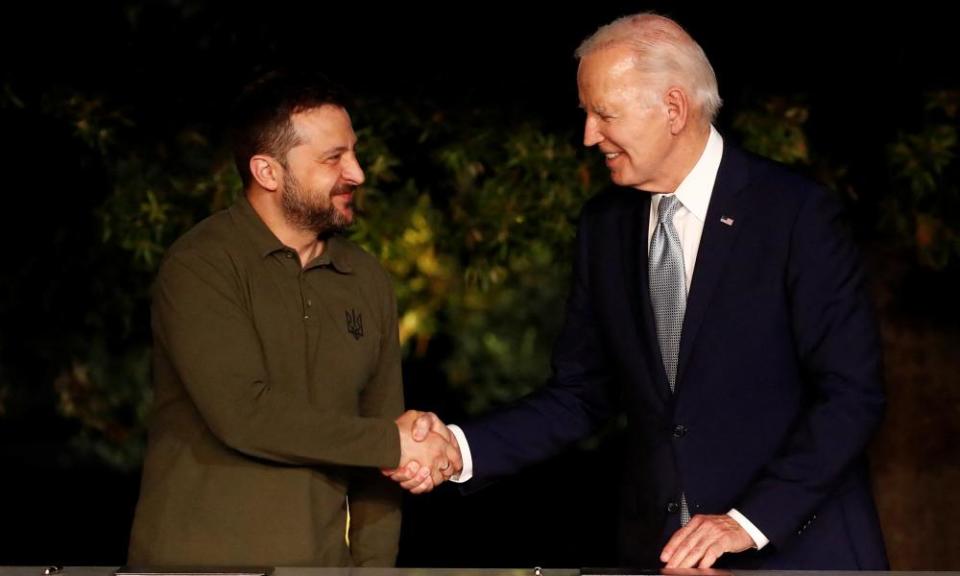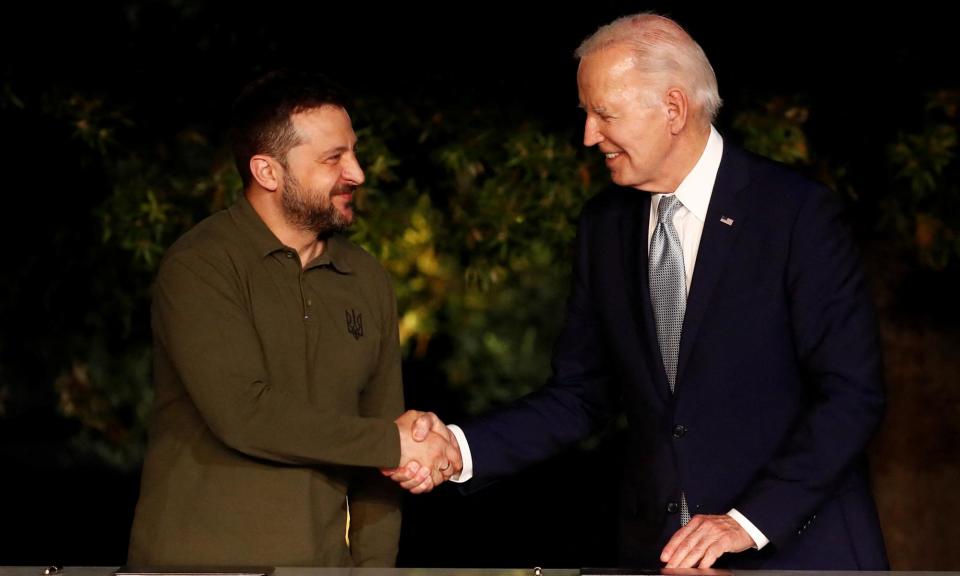Joe Biden says ‘democracies can deliver’ as G7 agree $50bn Ukraine aid deal
Joe Biden claimed “democracies can deliver” as he announced the leaders of the G7 western economies had finally reached an agreement that will mobilise an extra $50bn (£39bn) of aid to Ukraine using frozen Russian state assets.
Speaking at the G7 summit in Puglia, Italy, on Thursday, Biden hailed the breakthrough as he met Ukraine’s president Volodymr Zelenskiy and announced the two countries had also signed a 10-year bilateral security agreement, ending 12 months of difficult negotiations.
Related: Rishi Sunak denies he is being snubbed after awkward start to G7 summit
“We are putting our money to work for Ukraine, and giving another reminder to Putin that we are not backing down,” Biden said at a joint press conference with the Ukrainian leader.
Biden said arrangements were being made to provide Ukraine with five Patriot missile defence systems, saying: “Everything we have is going to Ukraine until its needs are met.”
But he ruled out US weapons being used to strike deeper into Russia beyond the weapons bases being used to strike the Ukrainian city of Kharkiv. “In terms of longer range of weapons into the interior of Russia we are not changing our positions,” he said.
Zelenskiy described the deal as the “strongest agreement” struck since his country’s independence in 1991. “Today is a truly historic day,” he said.
The Ukrainian leader described the security guarantee as “a very detailed legally binding agreement” that lasts not just for the duration of the war but afterwards, too. He said the deal covers intelligence cooperation and the strengthening of Ukrainian defence industries.
Zelenskiy said he had been given undertakings by the Chinese president Xi Jinping that Beijing would not sell weapons to Russia. “He gave me his word,” he said. But Biden argued that China, by supplying technology and dual-use components, was in fact arming Russia.
Earlier in the day, Biden sought to rally western political leaders as they face an unprecedented attack from the populist right, saying: “We stand at an inflection point in history that occurs every five or six, seven generations, and the decisions that we make now will determine the course of our future.
“I’m proud to announce the US has mobilised more than $50bn in investments around the world. Together we are showing democracies can deliver.”
His remarks came as the G7 reached an outline provisional deal to use the profits derived from frozen Russian sovereign assets to underwrite a $50bn loan to Ukraine designed to help fend off the impact of Russian military attacks.
The agreement, hammered out in complex legal talks over the past three months, will see a special fund operating by the end of the year with the cash flowing through multiple external channels to fund the military budget and reconstruction needs.
A loan syndicate would be established including multiple lenders sharing risk, but the scheme will not be run entirely by the EU or the US. The interest on the large loan is to be funded not by Ukraine but from the profits derived from the frozen Russian state assets.
Apart from the principle of mobilising frozen assets, one of the points of contention, still not fully resolved, was the ultimate indebtedness in the event of a default. Those who argued the entire tranche of Russian state assets could be transferred to Ukraine immediately as compensation for Russia’s unlawful attack came up against a wall of resistance from the IMF, which warned the repercussions of such a precedent could be fatal to confidence in the financial system.
It is not expected that the cash will be provided in a lump sum, and the danger from Ukraine’s perspective was that EU states would feel they can hold back providing planned aid on the basis that Ukraine has a new regular revenue stream.
But US officials said there were doubts about Ukraine’s capacity to absorb such a large sum in one tranche, and about its impact on inflation in Ukraine.
Speaking earlier Jake Sullivan, the US national security adviser, said: “The simple proposition is we got to put these assets to work. The complex proposition is how you do that specifically. I think we are on the verge of a good outcome.”
The aim is to make sure proceeds from the loan start reaching Ukraine well before the US presidential elections in November – and by then it will be hard for the fund to be unravelled by any Trump administration.
The bilateral security agreement between the US and Ukraine has not yet been published but is the 16th such bilateral agreement Ukraine has now reached. As an executive order, it could be undone by a Trump administration, but the intention is that the accumulation of agreements collectively adds up to a form of security assurance that, although not a substitute for full Nato membership, will make Russia think harder about a further attack on a country with such a matrix of western security alliances. Ukraine remains committed to seeking Nato membership.
In the world’s other major conflict, G7 leaders are largely waiting to see whether Egypt and Qatar can persuade Hamas to tone down their proposed amendments to the Biden peace plan disclosed three weeks ago. The draft G7 communique expresses their concerns about Israel’s ongoing ground operations in Rafah, but does not explicitly call on Israel to stop their current actions or set out any consequences if they do not.
The draft statement reads: “We are concerned about the consequences of the ongoing ground operations in Rafah on the civilian population and the possibility of a large-scale military offensive that would have further disastrous consequences on civilians. We call on the government of Israel to refrain from such an offensive, in line with its obligations under international law.”
It also urges that “all parties must refrain from any unilateral action that undermines the prospect of a two-state solution, including Israeli settlement expansion and the ‘legalisation’ of settlement outposts. We condemn the increase in extremist settler violence committed against Palestinians, which undermines security and stability in the West Bank and threatens the prospects for lasting peace.”
The statement also reaffirms its commitment to the vision of a two-state solution in which two democratic states, Israel and Palestine, coexist side by side in peace within secure and recognised borders.
It also calls for the recognition of a Palestinian State at an appropriate time and that Gaza and the West Bank should be administered jointly by the Palestinian Authority.

 Yahoo News
Yahoo News 

